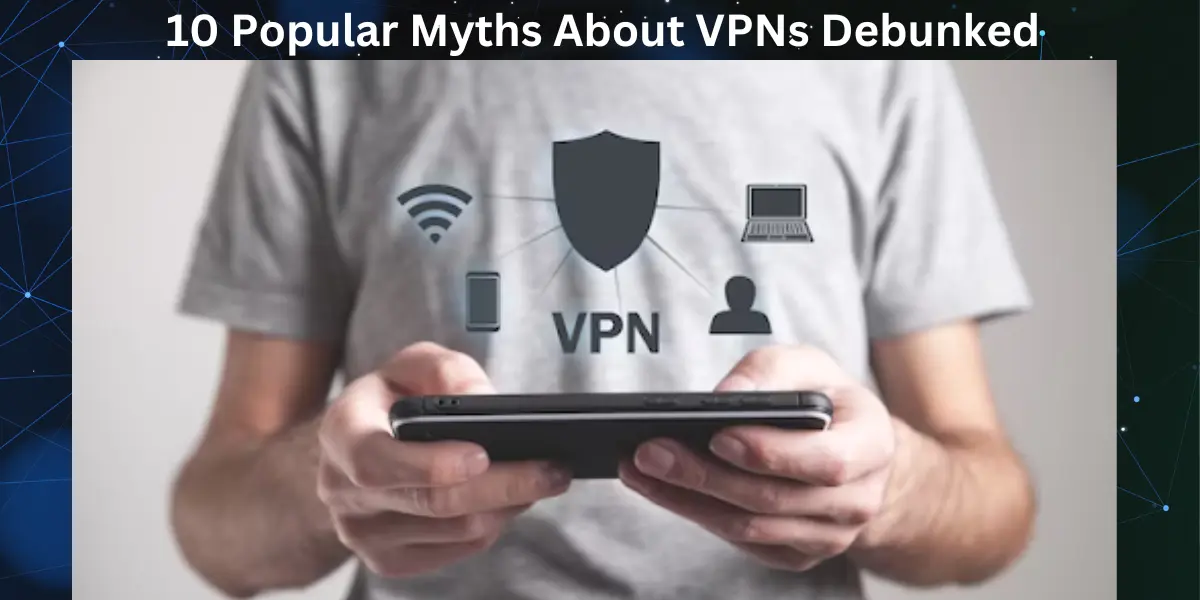In the digital world, online privacy and security are paramount for which Virtual Private Networks (VPNs) have gained significant popularity. However, several myths and misconceptions surrounding VPNs persist. Hence this post, where we have debunked 10 popular myths and misconceptions surrounding VPNs. Have a quick look.

Myth 1: VPN is Illegal
Fact: VPN usage is legal in most countries, including the United States, Canada, and many European nations. While a few countries impose restrictions on VPNs to control illegal activities or protect national security, using a VPN for legitimate purposes within the bounds of the law is entirely legal and widely accepted.
Myth 2: VPNs Suffice for Online Privacy and Security
Fact: While VPNs play a crucial role in enhancing online privacy and security, they are not the sole solution. VPNs encrypt your internet data, making it difficult for third parties and snoopers to intercept and decipher it. However, maintaining strong passwords, keeping your antivirus software up to date, and practicing safe browsing habits are equally important for comprehensive online security. To know more about which Cyber threats a VPN can and can’t protect you from, you may want to read this article.
Myth 3: VPN is Only for Tech-Savvy Users
Fact: VPN technology has advanced significantly, and many VPN providers now offer user-friendly apps and intuitive interfaces. Setting up and using a VPN has become increasingly accessible, even for individuals with limited technical expertise. VPNs are designed to be user-friendly and provide seamless protection for users across various backgrounds. Here’s our quick guide to help you set up VPN on different devices on your own.
Myth 4: VPN is for Criminals
Fact: VPNs are not exclusively used by criminals. While it is true that several individuals with malicious intent may misuse VPNs to engage in illegal activities, the majority of VPN users utilize them for legitimate purposes. VPNs are essential tools for protecting privacy, securing data, and accessing geo-restricted content, ensuring a safe and unrestricted online experience.
Myth 5: A Proxy Can Offer the Same Benefits as a VPN
Fact: While both proxies and VPNs can route your internet traffic through a different server, they differ significantly in terms of security and functionality. Proxies primarily mask your IP address but do not encrypt your data, leaving it vulnerable to interception. VPNs, on the other hand, provide robust encryption, ensuring the security and privacy of online activities.
Myth 6: Only Paranoid People Use a VPN
Fact: VPN usage has nothing to do with paranoia. With the growing awareness of online privacy threats and data breaches, using a VPN has become a prudent step for anyone concerned about protecting their personal information and maintaining digital privacy. VPNs are used by individuals and organizations alike to safeguard sensitive data and maintain online security.
Myth 7: It's Bad for a VPN to be Located in a Five Eyes Country
Fact: The Five Eyes alliance is an intelligence-sharing partnership between certain countries. While concerns have been raised about VPNs located in these countries, it is essential to note that the location alone does not determine a VPN's trustworthiness. What matters most is the VPN provider's commitment to privacy, strict no-logs policies and transparency in their operations.
Myth 8: Paid VPNs are a Scam
Fact: While there are undoubtedly spurious and subpar VPN services in the market, paid VPNs, when chosen wisely, offer substantial benefits. Paid VPNs typically provide better security, faster speeds, a wider range of server locations, and dedicated customer support. It is crucial to research and select reputable VPN providers with positive user reviews and a track record of trustworthiness.
If you are still not sure whether to opt for a free VPN or a paid one? Don’t worry, we have you covered.
Myth 9: IT Teams Always Face Difficulty Scaling Up VPNs
Fact: While scaling up VPNs can pose challenges, modern VPN solutions are designed to accommodate the requirements of businesses and organizations of all sizes. With proper planning, network optimization, and the use of VPN management tools, IT teams can effectively scale up VPN infrastructures to meet growing demands without compromising performance or security.
Myth 10: VPNs Always Hinder User Experience
Fact: While it is true that using a VPN can introduce some overhead due to encryption and routing, high-quality VPN services are designed to minimize any noticeable impact on user experience. With advancements in VPN technology, optimized server networks, and improved protocols, VPNs can deliver fast and seamless browsing, streaming and downloading experiences.
Conclusion:
By debunking these popular myths about VPNs, we hope to provide you with accurate information and dispel any misconceptions surrounding their usage. VPNs are legal tools that offer enhanced privacy, security, and unrestricted access to the online world. Thus, selecting a reputable VPN provider and understanding its capabilities is essential to ensure your online activities are protected, and your digital presence remains secure.

